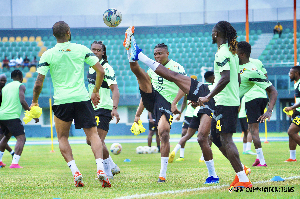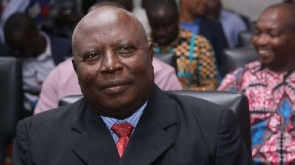- Home - News
- TWI News | TV
- Polls
- Year In Review
- News Archive
- Crime & Punishment
- Politics
- Regional
- Editorial
- Health
- Ghanaians Abroad
- Tabloid
- Africa
- Religion
- Election 2020
- Coronavirus
- News Videos | TV
- Photo Archives
- News Headlines
- Press Release
Editorial News of Friday, 18 July 2008
Source: Public Agenda
EDITORIAL: The Ghana Telecom Deal Cannot Hold
Yesterday, the government hurriedly tabled the proposal for the sale of 70 percent of Ghana Telecom to Vodafone before parliament for approval. The government could get the deal approved, using its sheer numbers in parliament, but it would leave several unanswered questions over the prudence of the deal.
One thing that readily came to mind was that anytime government wants to foist a particular policy on the country, it waits until parliament is about to go on recess before rushing it. This raises the question once more over the executive's overbearing powers over the legislature
One trend that is emerging is that anytime an open and transparent procurement or evaluation process does not yield the answer the government likes, it abrogates it and appears to impose its own solution, often against the public interest. This is exactly what appears to have happened with the proposed sale of Ghana Telecom to Vodafone.
It also happened with Ghana Airways and the construction of the Ghana 2008 stadiums etc. Are we no longer interested in implementing the new Procurement Act which was passed recently by Parliament? If the government opened the deal to transparent bidding for the second time, we might have had a better deal than the $900 million Vodafone has offered. This newspaper adds its voice to civil society groups arguing that the deal with Vodafone smacks of a shady deal, considering the fact that MTN acquired then Areeba, whose assets come no where near GT's assets for a whooping $5 billion.
As with Ghana Airways, justification for the sale of Vodafone is that the government wants 'a strategic investor' - whatever that means. The fact is that Ghana Telecom's 1.4 million mobile customers represent just over 0.5 percent of Vodafone's global subscriber base of 260 million. How strategic is that for Vodafone?
Granted that Vodafone even achieves 100 percent mobile penetration with a relative small population of 22 million people, it would still be less than 10 percent of Vodafone's global subscribers. So it remains to be seen whether or not this is as strategic for Vodafone as the government assumes it would be for Ghana.
This worries over the strategy of Ghana handing over her fixed telecom network to a company that is the world's largest mobile provider by revenue, but has relatively little experience of running or investing in building fixed telecom networks anywhere in the world? What exactly will Vodafone bring in terms of deep and in-house experience to this business?
We join other civil society groups calling on the government to take a second look at the sale. Selling huge assets of GT perhaps, to pay off some debts or balance an aspect of the budget will only create a false sense of fiscal stability. When we have sold all the assets to balance things here and there, what will be left for future generations to boast of? A restructured and well tooled GT capable of generating sustainable revenues for the state is a better option.
It is our fear that unless the state has controlling interest in GT, its e-government and other ICT initiatives for our schools, hospitals and the rural areas might not be a priority to Vodafone. Yet, GT's broadband facility, (in addition to the country's fibre optic backbone) has been handed over to Vodafone, which by default would become a monopoly provider. Transferring a public monopoly to a private monopoly cannot be good for the future of our country.










